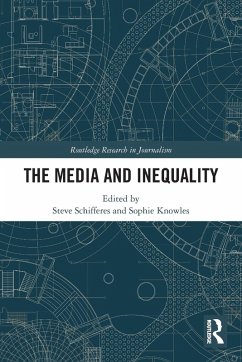The Media and Inequality
Herausgeber: Schifferes, Steve; Knowles, Sophie
The Media and Inequality
Herausgeber: Schifferes, Steve; Knowles, Sophie
- Broschiertes Buch
- Merkliste
- Auf die Merkliste
- Bewerten Bewerten
- Teilen
- Produkt teilen
- Produkterinnerung
- Produkterinnerung
This book brings together a range of experts, academics, and practitioners to interrogate the role of media in representing economic inequality. It will be of interest to scholars working in areas such as journalism, media studies, economics, the social sciences, as well as to political commentators and those interested in social policy.
Andere Kunden interessierten sich auch für
![The Performer in Mass Media The Performer in Mass Media]() Beth OlsonThe Performer in Mass Media46,99 €
Beth OlsonThe Performer in Mass Media46,99 €![The Media and Aid in Sub-Saharan Africa The Media and Aid in Sub-Saharan Africa]() Lena von NasoThe Media and Aid in Sub-Saharan Africa56,99 €
Lena von NasoThe Media and Aid in Sub-Saharan Africa56,99 €![Transparency, Public Relations and the Mass Media Transparency, Public Relations and the Mass Media]() Katerina TsetsuraTransparency, Public Relations and the Mass Media28,99 €
Katerina TsetsuraTransparency, Public Relations and the Mass Media28,99 €![Al Jazeera and the Global Media Landscape Al Jazeera and the Global Media Landscape]() Tine Ustad FigenschouAl Jazeera and the Global Media Landscape61,99 €
Tine Ustad FigenschouAl Jazeera and the Global Media Landscape61,99 €![Korean Literature Through the Korean Wave Korean Literature Through the Korean Wave]() Jieun KiaerKorean Literature Through the Korean Wave52,99 €
Jieun KiaerKorean Literature Through the Korean Wave52,99 €![The International Photojournalism Industry The International Photojournalism Industry]() Jonathan IlanThe International Photojournalism Industry55,99 €
Jonathan IlanThe International Photojournalism Industry55,99 €![The Pursuit of Public Journalism The Pursuit of Public Journalism]() Tanni HaasThe Pursuit of Public Journalism51,99 €
Tanni HaasThe Pursuit of Public Journalism51,99 €-
-
-
This book brings together a range of experts, academics, and practitioners to interrogate the role of media in representing economic inequality. It will be of interest to scholars working in areas such as journalism, media studies, economics, the social sciences, as well as to political commentators and those interested in social policy.
Produktdetails
- Produktdetails
- Verlag: Routledge
- Seitenzahl: 266
- Erscheinungstermin: 26. August 2024
- Englisch
- Abmessung: 234mm x 156mm x 14mm
- Gewicht: 409g
- ISBN-13: 9780367611750
- ISBN-10: 0367611759
- Artikelnr.: 71231397
- Herstellerkennzeichnung
- Libri GmbH
- Europaallee 1
- 36244 Bad Hersfeld
- gpsr@libri.de
- Verlag: Routledge
- Seitenzahl: 266
- Erscheinungstermin: 26. August 2024
- Englisch
- Abmessung: 234mm x 156mm x 14mm
- Gewicht: 409g
- ISBN-13: 9780367611750
- ISBN-10: 0367611759
- Artikelnr.: 71231397
- Herstellerkennzeichnung
- Libri GmbH
- Europaallee 1
- 36244 Bad Hersfeld
- gpsr@libri.de
Steve Schifferes is currently Honorary Research Fellow at City University London's Political Economy Research Centre (CityPERC) in the UK, where he was the Marjorie Deane Professor of Financial Journalism from 2009 to 2017. He has lectured widely on the global financial crisis and is the co-editor of two volumes, The Media and Financial Crises (2015), and The Media and Austerity (Routledge, 2018). He reported on economics and business for BBC News from 1989 to 2009. Sophie Knowles is Senior Lecturer in Journalism at Middlesex University, UK. She has written widely on the media's role in the global financial crisis. She co-edited The Media and Austerity: Comparative Perspectives (Routledge, 2018). Her new book, The Mediation of Financial Crises: Watchdogs, Lapdogs or Canaries in the Coal Mine, was published in 2020.
List of Figures and Tables
Notes on Contributors
Acknowledgements
Remembering John Hills by Howard Glennerster
Introduction: The Media and Inequality
Part I: Understanding Inequality
1. Flat-lining or Seething Beneath the Surface? Two Decades of Changing Economic Inequality in the UK
2. Wealth Inequality in the UK
3. The Decline of Social Mobility
4. Racial Economic Inequality: The Visible Tip of an Inequality Iceberg?
5. Home Ownership: The Key to Inequality?
Part II: Framing Poverty and Inequality
6. Poverty and the Media: Poverty Myths and Exclusion in the Information Society
7. The Rhetoric of Recession: How British Newspapers Talk About the Poor When Unemployment Rises
8. Factual Television in the UK: The Rich, the Poor and Inequality
9. Issue Attention to Income Inequality in the UK and US Print Media
10. Comparative Trends in the Portrayal of Poverty and Inequality
Part III: Public Opinion, Inequality, and the Media
11. Public Attitudes to Poverty and Inequality
12. Debating Inequality: The Case of Piketty's Capital in the 21st Century
13. The Media and Austerity
14. Covid, Inequality and the Media
15. Stuck in a Feedback Loop: Why More Inequality Leads to Lower Levels of Concern
Notes on Contributors
Acknowledgements
Remembering John Hills by Howard Glennerster
Introduction: The Media and Inequality
Part I: Understanding Inequality
1. Flat-lining or Seething Beneath the Surface? Two Decades of Changing Economic Inequality in the UK
2. Wealth Inequality in the UK
3. The Decline of Social Mobility
4. Racial Economic Inequality: The Visible Tip of an Inequality Iceberg?
5. Home Ownership: The Key to Inequality?
Part II: Framing Poverty and Inequality
6. Poverty and the Media: Poverty Myths and Exclusion in the Information Society
7. The Rhetoric of Recession: How British Newspapers Talk About the Poor When Unemployment Rises
8. Factual Television in the UK: The Rich, the Poor and Inequality
9. Issue Attention to Income Inequality in the UK and US Print Media
10. Comparative Trends in the Portrayal of Poverty and Inequality
Part III: Public Opinion, Inequality, and the Media
11. Public Attitudes to Poverty and Inequality
12. Debating Inequality: The Case of Piketty's Capital in the 21st Century
13. The Media and Austerity
14. Covid, Inequality and the Media
15. Stuck in a Feedback Loop: Why More Inequality Leads to Lower Levels of Concern
List of Figures and Tables
Notes on Contributors
Acknowledgements
Remembering John Hills by Howard Glennerster
Introduction: The Media and Inequality
Part I: Understanding Inequality
1. Flat-lining or Seething Beneath the Surface? Two Decades of Changing Economic Inequality in the UK
2. Wealth Inequality in the UK
3. The Decline of Social Mobility
4. Racial Economic Inequality: The Visible Tip of an Inequality Iceberg?
5. Home Ownership: The Key to Inequality?
Part II: Framing Poverty and Inequality
6. Poverty and the Media: Poverty Myths and Exclusion in the Information Society
7. The Rhetoric of Recession: How British Newspapers Talk About the Poor When Unemployment Rises
8. Factual Television in the UK: The Rich, the Poor and Inequality
9. Issue Attention to Income Inequality in the UK and US Print Media
10. Comparative Trends in the Portrayal of Poverty and Inequality
Part III: Public Opinion, Inequality, and the Media
11. Public Attitudes to Poverty and Inequality
12. Debating Inequality: The Case of Piketty's Capital in the 21st Century
13. The Media and Austerity
14. Covid, Inequality and the Media
15. Stuck in a Feedback Loop: Why More Inequality Leads to Lower Levels of Concern
Notes on Contributors
Acknowledgements
Remembering John Hills by Howard Glennerster
Introduction: The Media and Inequality
Part I: Understanding Inequality
1. Flat-lining or Seething Beneath the Surface? Two Decades of Changing Economic Inequality in the UK
2. Wealth Inequality in the UK
3. The Decline of Social Mobility
4. Racial Economic Inequality: The Visible Tip of an Inequality Iceberg?
5. Home Ownership: The Key to Inequality?
Part II: Framing Poverty and Inequality
6. Poverty and the Media: Poverty Myths and Exclusion in the Information Society
7. The Rhetoric of Recession: How British Newspapers Talk About the Poor When Unemployment Rises
8. Factual Television in the UK: The Rich, the Poor and Inequality
9. Issue Attention to Income Inequality in the UK and US Print Media
10. Comparative Trends in the Portrayal of Poverty and Inequality
Part III: Public Opinion, Inequality, and the Media
11. Public Attitudes to Poverty and Inequality
12. Debating Inequality: The Case of Piketty's Capital in the 21st Century
13. The Media and Austerity
14. Covid, Inequality and the Media
15. Stuck in a Feedback Loop: Why More Inequality Leads to Lower Levels of Concern









